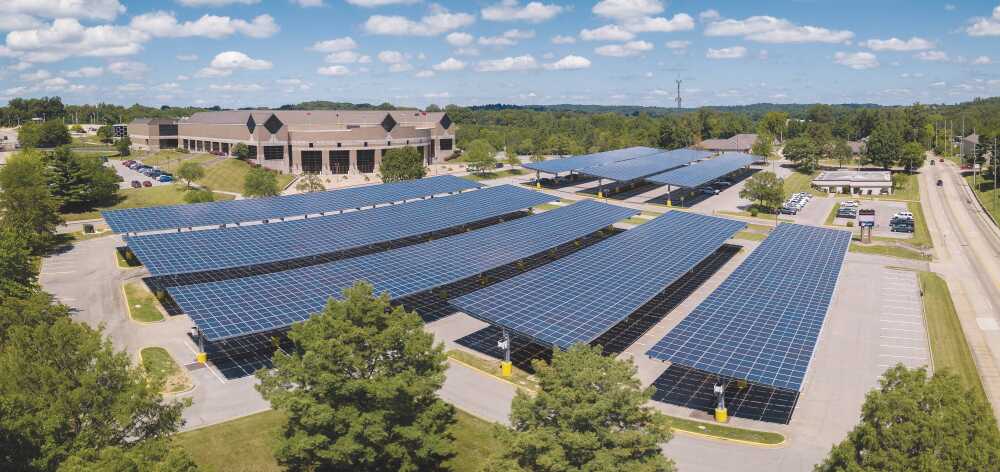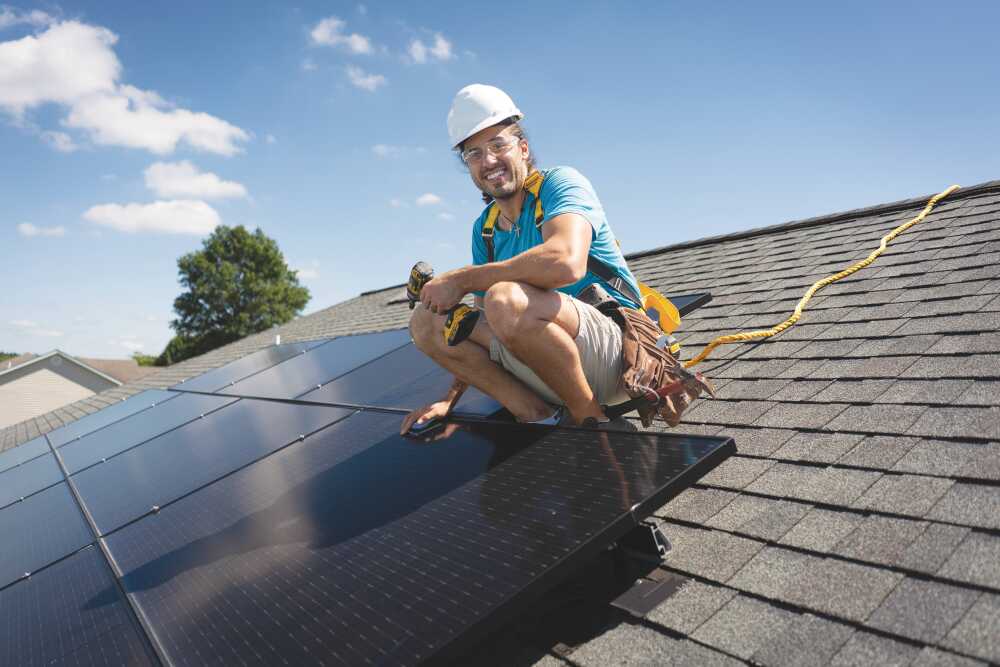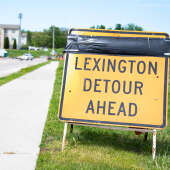Congress gives boost to renewables; local solar providers poised to benefit

Solar energy advocates receive a big boost this month thanks to Capitol Hill.
On Aug. 6, the U.S. Senate passed by a tally of 51-50, with Vice President Kamala Harris casting the tie-breaking procedural vote, the Inflation Reduction Act. Among the “no” Senate votes were Missouri’s Josh Hawley and retiring Roy Blunt.
The measure won approval in the House and earned the signature of President Joe Biden.
According to online magazine Barron’s, the sweeping legislation — among other things — will unlock $400 billion in clean energy funding, with wind and solar the primary beneficiaries.
“Sources of energy like solar panels that seemed anachronistic tree-hugger technology less than a decade ago have become key parts of base-load electricity generation,” read the Aug. 7 Barron’s article.
“A patchwork system of tax credits and environmental rules is now giving way to much more robust government support, not just in the U.S. but around the world. The [U.S.] climate bill and a European plan called Repower EU will together pump more than half a trillion dollar’s worth of subsidies into the market and remove much of the financing risk now associated with building large-scale renewable projects. The pace is sure to pick up from there. Annual clean energy investment worldwide will need to triple to $4 trillion by 2030 to meet the widely held commitment to net-zero carbon emissions by 2050, according to international Energy Agency,” the Barron’s article continued.
SEMO solar
Drivers on North Sprigg Street motoring past Cape Girardeau’s Show Me Center cannot fail to notice solar panel canopies in the venue’s parking lot.
The Neighborhood Solar Project (NSP), a joint clean energy initiative of Southeast Missouri State University and Ameren Missouri, was scheduled to be completed and connected to the Ameren grid this summer.
According to SEMO’s campus radio station, KRCU, NSP — which will expand to three St. Louis locations in 2023 is the largest neighborhood solar initiative in the state.
“[Among] the benefits (NSP) provides for students and really the community is the canopy parking,” said Ameren’s Russell Berger.
“We all want cleaner energy and we’re proud to partner with [SEMO] to provide some clean energy to go on to our grid. This solar energy center will produce enough energy to power 130 homes a year.”
NSP was announced by Ameren and SEMO in November.
Solar growth
According to data compiled by Whitney Quick, Cape Girardeau-based regional director of Better Business Bureau, solar appears to be slowly catching on in the U.S.
“One in every 600 Americans, according to Solar Energy Industries Association, is adding solar panels to their homes every quarter,” Quick noted in an informational email to B Magazine.
BBB, Quick said, advises consumers to do their homework before going solar, noting BBB received more than 2,300 complaints last year about solar energy businesses.
“In many cases, consumers said solar panels did not work as promised and said they didn’t realize the energy savings pledged. Others said there were installation problems and service issues after the sale with some homeowners claiming they were misled by sales representatives,” Quick said.
“In August 2021, an O’Fallon, Missouri, man told BBB a local company had damaged his roof during solar installation. In the course of fixing the resulting leak, the company altered the home’s vents — which as a result were no longer up to code,” Quick explained, adding the company did not show up on schedule to fix the vents.
Providers
■ David Alcorn of Dutchtown’s Alcorn Electric has been installing residential energy-collecting solar panels for 12 years.
Alcorn said he hopes the government will do more to help installers who put their capital at risk buying panels in the hope customers will choose solar energy.
“It would be very much appreciated, yes,” said Alcorn, a 27-year electrician who received his certification to install solar panels in San Antonio, Texas.
“It’s a lot fiscally and mentally to get all this stuff ordered and figured up and there’s a lot of calculations that goes into it.”
Alcorn said the typical residential customer who opts for solar chooses a 10,000-watt system costing roughly $30,000.
“Such a system requires 40 panels and will save the customer about $200 a month in a typical electric bill,” Alcorn said.
Alcorn referenced a misconception, which suggests a solar panel is only effective on sunny days.
“When it’s overcast, [panels] still do OK just not as great as when there is no sun. Solar panels like ultraviolet [UV} rays but not extreme heat. When it’s really hot, the efficiency goes down,” Alcorn said.

■ Jake Long launched Jackson Solar in November and told B Magazine while there are different size systems, he typically installs an 8,000-watt system for homes that costs $20,500.
“[That price] is before federal tax incentives,” said Long, who graduated Jackson High School and SEMO, earning an additional degree from Texas’ Kilgore College.
“[My Kilgore] degree is basically in electrochemistry, which is exactly what solar panels are, and I got great hands-on experience there,” he said.
“I’m really passionate about this field and about sustainable energy in general,” he added.
Long, who finished SEMO in 2014, said not all that long ago it was not economically feasible to get into solar installation, in his opinion.
“The prices on [solar] panels seven years ago were way too high but in the past couple of years, [customer] demand has gone up and we’ve had factories open here in America which triggered mass production. As a result, prices have started to go down. Equipment prices are falling and warranties are getting better. The whole notion of going solar is just now becoming feasible,” he said.
Long has kept up with the local electric vehicle (EV) readiness plan that is coming up for a vote in September by Cape Girardeau-based Southeast Metropolitan Planning Organization (SEMPO).
He offered a scenario for homeowners who go solar and who also buy an EV.
“You can go down to the dealership and buy a Nissan Leaf,” Long said, referring to a battery electric vehicle.
“[Jackson Solar] can order materials to get an 8,000-watt system installed on your home. If you drive that Leaf, for example, 120 miles per week, and you are charging your EV at home, overall you’re going to save $200 a month bottom line.”
Outlook
Both local installers see a bright future for solar.
“The industry is constantly working on increasing the power of these solar panels because of the impact of global warming. Solar, in my opinion, should really take off soon,” opined Alcorn.
“I saw an up-and-coming industry and at first, it didn’t grow as fast as I thought it would, but now here we are today,” added Long.
Solar “shopping”
BBB is offering tips for those giving serious consideration to making the transition to solar energy.
■ Do a self-audit. Put pencil to paper and determine if a solar unit will help save money on energy bills. Keep track of how many sunny days you see on an annual basis and check the roof to make sure the home is equipped to sustain solar panels.
■ Make a budget. Solar energy is a major upfront expense promising savings down the line. Get bids from several different companies and remember the lowest bid isn’t always the best for you. If you finance solar installation, make sure to factor in various loan charges.
■ Look into tax credits. A homeowner may be eligible for various local, state and federal assistance. This includes the Federal Residential Clean Energy credit which includes up to 30% of the cost of qualifying systems. U.S. Department of Energy keeps a database of state-specific credits.
■ Read the contract. Make sure the contract mirrors everything a salesperson has promised. Know the length of the contract and the estimate for payment post-installation. Make sure any fees are detailed and note who is responsible for repairs during the contract’s duration.
■ Report bad actors. If a consumer has trouble with a solar energy installer, file a report with BBB, Federal Trade Commission and with the state attorney general’s office.
Note: Jake Long is not related to the author of this article.


































Respond to this story
Posting a comment requires a subscription.